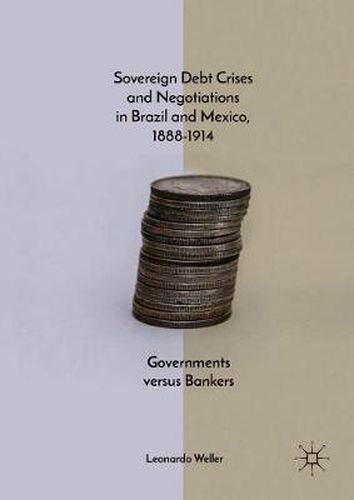Readings Newsletter
Become a Readings Member to make your shopping experience even easier.
Sign in or sign up for free!
You’re not far away from qualifying for FREE standard shipping within Australia
You’ve qualified for FREE standard shipping within Australia
The cart is loading…






This title is printed to order. This book may have been self-published. If so, we cannot guarantee the quality of the content. In the main most books will have gone through the editing process however some may not. We therefore suggest that you be aware of this before ordering this book. If in doubt check either the author or publisher’s details as we are unable to accept any returns unless they are faulty. Please contact us if you have any questions.
This book analyzes the relative balance of bargaining power between governments and the banks in charge of underwriting their debt during the first financial globalization. Brazil and Mexico, both indebted countries that underwent major changes in reputation and negotiating power as they faced financial crises, provide valuable case studies of government strategies for obtaining the best possible outcomes. Previous literature has focused on bankers’ perspectives and emphasized that debtors were submissive during negotiations, but Weller finds that governments’ negotiating power varied over time. He presents a new analytical framework that interprets when and why officials were likely to negotiate loans more or less effectively, with newly uncovered primary sources from debtors’ and creditors’ archives suggesting key causes of variation: fiscal accounts, political stability, and creditors’ exposure and reputation.
$9.00 standard shipping within Australia
FREE standard shipping within Australia for orders over $100.00
Express & International shipping calculated at checkout
This title is printed to order. This book may have been self-published. If so, we cannot guarantee the quality of the content. In the main most books will have gone through the editing process however some may not. We therefore suggest that you be aware of this before ordering this book. If in doubt check either the author or publisher’s details as we are unable to accept any returns unless they are faulty. Please contact us if you have any questions.
This book analyzes the relative balance of bargaining power between governments and the banks in charge of underwriting their debt during the first financial globalization. Brazil and Mexico, both indebted countries that underwent major changes in reputation and negotiating power as they faced financial crises, provide valuable case studies of government strategies for obtaining the best possible outcomes. Previous literature has focused on bankers’ perspectives and emphasized that debtors were submissive during negotiations, but Weller finds that governments’ negotiating power varied over time. He presents a new analytical framework that interprets when and why officials were likely to negotiate loans more or less effectively, with newly uncovered primary sources from debtors’ and creditors’ archives suggesting key causes of variation: fiscal accounts, political stability, and creditors’ exposure and reputation.